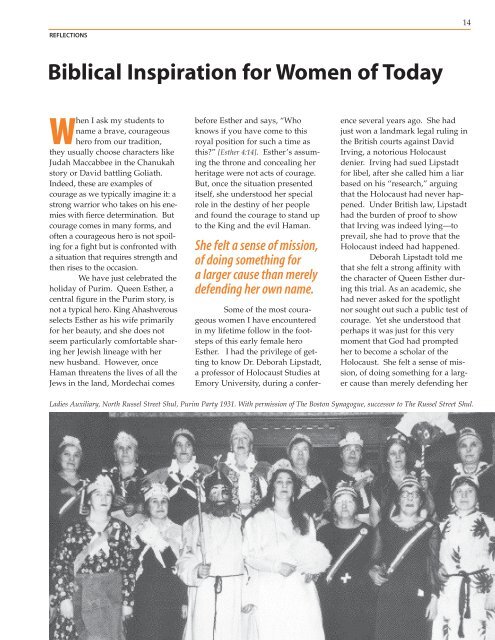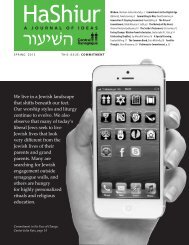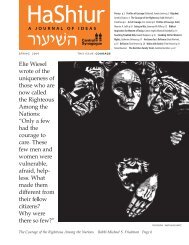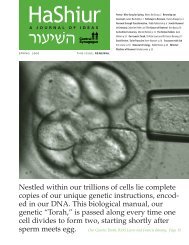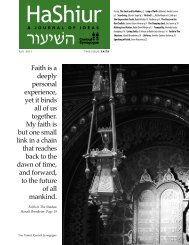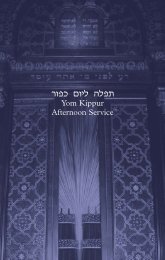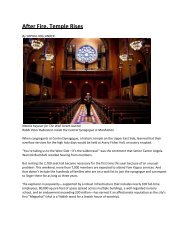Elie Wiesel wrote of the uniqueness of those who are now called the ...
Elie Wiesel wrote of the uniqueness of those who are now called the ...
Elie Wiesel wrote of the uniqueness of those who are now called the ...
You also want an ePaper? Increase the reach of your titles
YUMPU automatically turns print PDFs into web optimized ePapers that Google loves.
0380 3/24/09 8:37 AM Page 14<br />
REFLECTIONS<br />
Biblical Inspiration for Women <strong>of</strong> Today<br />
When I ask my students to<br />
name a brave, courageous<br />
hero from our tradition,<br />
<strong>the</strong>y usually choose characters like<br />
Judah Maccabbee in <strong>the</strong> Chanukah<br />
story or David battling Goliath.<br />
Indeed, <strong>the</strong>se <strong>are</strong> examples <strong>of</strong><br />
courage as we typically imagine it: a<br />
strong warrior <strong>who</strong> takes on his enemies<br />
with fierce determination. But<br />
courage comes in many forms, and<br />
<strong>of</strong>ten a courageous hero is not spoiling<br />
for a fight but is confronted with<br />
a situation that requires strength and<br />
<strong>the</strong>n rises to <strong>the</strong> occasion.<br />
We have just celebrated <strong>the</strong><br />
holiday <strong>of</strong> Purim. Queen Es<strong>the</strong>r, a<br />
central figure in <strong>the</strong> Purim story, is<br />
not a typical hero. King Ahashverous<br />
selects Es<strong>the</strong>r as his wife primarily<br />
for her beauty, and she does not<br />
seem particularly comfortable sharing<br />
her Jewish lineage with her<br />
new husband. However, once<br />
Haman threatens <strong>the</strong> lives <strong>of</strong> all <strong>the</strong><br />
Jews in <strong>the</strong> land, Mordechai comes<br />
before Es<strong>the</strong>r and says, “Who<br />
k<strong>now</strong>s if you have come to this<br />
royal position for such a time as<br />
this?” [Es<strong>the</strong>r 4:14]. Es<strong>the</strong>r’s assuming<br />
<strong>the</strong> throne and concealing her<br />
heritage were not acts <strong>of</strong> courage.<br />
But, once <strong>the</strong> situation presented<br />
itself, she understood her special<br />
role in <strong>the</strong> destiny <strong>of</strong> her people<br />
and found <strong>the</strong> courage to stand up<br />
to <strong>the</strong> King and <strong>the</strong> evil Haman.<br />
She felt a sense <strong>of</strong> mission,<br />
<strong>of</strong> doing something for<br />
a larger cause than merely<br />
defending her own name.<br />
Some <strong>of</strong> <strong>the</strong> most courageous<br />
women I have encountered<br />
in my lifetime follow in <strong>the</strong> footsteps<br />
<strong>of</strong> this early female hero<br />
Es<strong>the</strong>r. I had <strong>the</strong> privilege <strong>of</strong> getting<br />
to k<strong>now</strong> Dr. Deborah Lipstadt,<br />
a pr<strong>of</strong>essor <strong>of</strong> Holocaust Studies at<br />
Emory University, during a confer-<br />
14<br />
ence several years ago. She had<br />
just won a landmark legal ruling in<br />
<strong>the</strong> British courts against David<br />
Irving, a notorious Holocaust<br />
denier. Irving had sued Lipstadt<br />
for libel, after she <strong>called</strong> him a liar<br />
based on his “research,” arguing<br />
that <strong>the</strong> Holocaust had never happened.<br />
Under British law, Lipstadt<br />
had <strong>the</strong> burden <strong>of</strong> pro<strong>of</strong> to show<br />
that Irving was indeed lying—to<br />
prevail, she had to prove that <strong>the</strong><br />
Holocaust indeed had happened.<br />
Deborah Lipstadt told me<br />
that she felt a strong affinity with<br />
<strong>the</strong> character <strong>of</strong> Queen Es<strong>the</strong>r during<br />
this trial. As an academic, she<br />
had never asked for <strong>the</strong> spotlight<br />
nor sought out such a public test <strong>of</strong><br />
courage. Yet she understood that<br />
perhaps it was just for this very<br />
moment that God had prompted<br />
her to become a scholar <strong>of</strong> <strong>the</strong><br />
Holocaust. She felt a sense <strong>of</strong> mission,<br />
<strong>of</strong> doing something for a larger<br />
cause than merely defending her<br />
Ladies Auxiliary, North Russel Street Shul, Purim Party 1931. With permission <strong>of</strong> The Boston Synagogue, successor to The Russel Street Shul.


